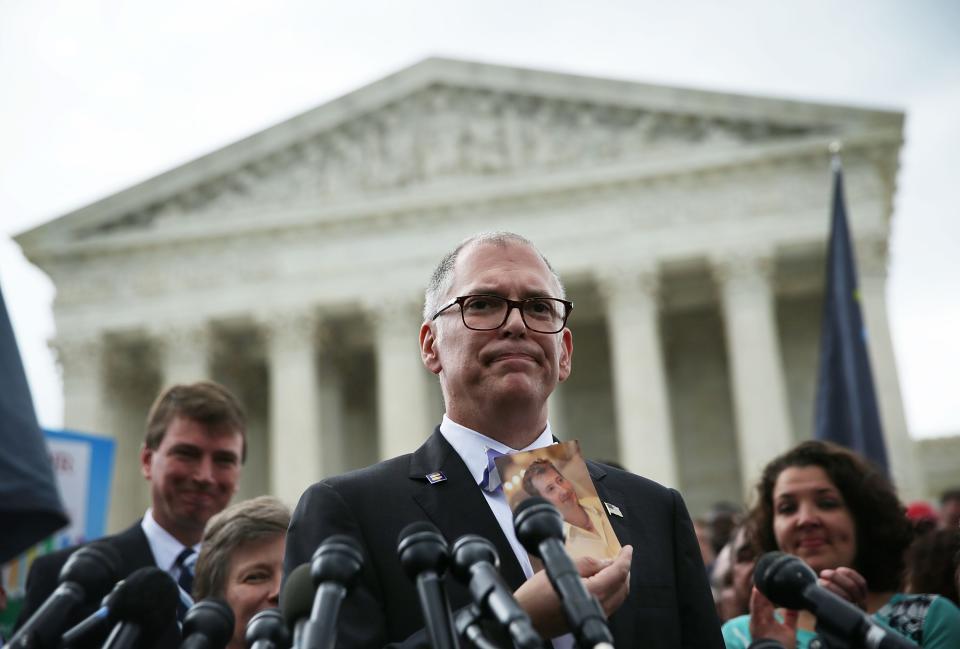'Very threatening' for LGBTQ community: Same-sex marriage defendant, plaintiff join forces to oppose Amy Coney Barrett's nomination
Two names will be remembered as on opposing sides in the case that made same-sex marriage equality the law of the land.
But to each other, they are just Jim and Rick.
Jim Obergefell became a civil rights activist after the landmark 2015 case bearing his name as the plaintiff. He and the man on the other side of the v, Richard Hodges, former director of the Ohio Department of Health, have developed a friendship.
"It is awfully fun to surprise people when they find out we're friends," Obergefell said.
More surprising: They share "the same commitment to equal rights for all," Hodges said.
The two litigants teamed up at a press conference for Family Equality, an organization advocating for LGBTQ families. This time, they had an urgent message: That the confirmation of Amy Coney Barrett to the Supreme Court is rushed – and it's "very threatening" to the LGBTQ community.
Although they have previously discussed their experiences with the landmark case and their resulting friendship, before this week the two had never actively lobbied for a cause together.
But Barrett's confirmation threatens the very rights he fought for, Obergefell said, and it was time to speak up.
"The fear is very real" that marriage rights could be dismantled, Obergefell said in an exclusive interview with USA TODAY before a press conference announcing their opposition to Barrett's nomination. It is "very realistic for us to be concerned about what could happen to our right to marry or our families."
Hodges told USA TODAY that in the 2015 case he had a duty to defend the Ohio constitution, which barred his agency from acknowledging same-sex married couples.

But the defense of equal rights "is a cause worth fighting for," he said, and he supports marriage equality.
Of bigger concern to him, however, is that the Senate "can't come together to protect people who are suffering from the coronavirus, but we can push a Supreme Court nominee through in record time."
Recently, the Supreme Court has defended the advancement of LGBTQ rights. But Obergefell worries that Barrett's confirmation could change that.
Barrett, President Donald Trump’s pick to replace the late Justice Ruth Bader Ginsburg, has given lectures to Alliance Defending Freedom, which the Southern Poverty Law Center has designated as an anti-LGBTQ hate group. Twenty-seven LGBTQ organizations opposed her confirmation to the Seventh Circuit Court of Appeals in 2017.
Supreme Court justicesset stage to end marriage equality
Obergefell pointed to Barrett's questioning of whether key civil rights protections include LGBTQ Americans.
At a 2016 lecture at Jacksonville University, Barrett said it would “strain” the text of Title IX to allow transgender people to use public restrooms that match their genders, categorizing trans women as “males.”
The Supreme Court ruled in June that that same law, which bars sex discrimination in the workplace, applies to gay, lesbian and transgender workers.
While Obergefell doesn't think that marriage equality legalization will be reversed in the court, he worries that Barrett's nomination will mean the "rights and responsibilities" that come with marriage could be chipped away.
This disintegration could mean "further erosion of protections in employment, education, housing, credit and more" for the LGBTQ community, he said.

Part of that erosion: the overturn of the Affordable Care Act.
About 65% of LGBTQ American have preexisting conditions, Obergefell said, compared with 50% of Americans overall. Barrett has made clear that she opposes the ACA, he said, which could mean the gutting of a government service that helps protect the LGBTQ community from discrimination in health care.
Hodges said Obergefell's reversal could lead to a "patchwork of rights depending on the state."
In separate interviews, he and Obergefell used the same label to describe the undermining of the institution of marriage for LGBTQ people.
"We weren't fighting for 'skim-milk marriages', as Ruth Bader Ginsburg calls them," Obergefell said. To have those "rights chipped away or eroded going forward is very concerning to us – and me especially."
"I just think we reached a place and a time when we have to affirm the dignity and equal legal rights of every human being," Hodges said.
Contributing: Richard Wolf, USA TODAY; Kate Sosin, the 19th
This article originally appeared on USA TODAY: Amy Coney Barrett: Jim Obergefell, Richard Hodges, LGTBTQ rights

